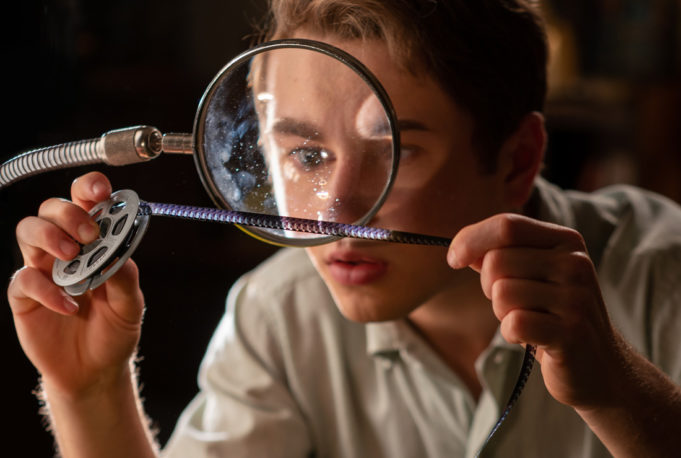This pandemic has made filmmakers turn to their own life stories for material: Kenneth Branagh in Belfast, James Gray in Armageddon Time, Elegance Bratton in the upcoming The Inspection. Are we burned out on these? Is that why Steven Spielberg’s The Fabelmans drew so little of an audience this past weekend? I don’t know if his movie is the best of these four, but it is quite likable and deserves more people watching it.
Spielberg’s fictional alter ego is Sammy Fabelman (played by Mateo Zoryan as a young boy and Gabriel LaBelle as a teenager), who is captivated in 1952 in New Jersey when his parents (Paul Dano and Michelle Williams) take him to see future Best Picture Oscar-winner The Greatest Show on Earth. Little Sammy requests a model train set as a Christmas gift from his dad, while his mom gives him a handheld movie camera. Soon they discover that he’s using the presents to recreate and film the scene from Cecil B. DeMille’s movie when two characters in a car intentionally derail a train. After Dad uproots the family to Phoenix, Sammy continues making films with a Boy Scout troop, using his fellow Scouts as actors and crew members.
The director and his writing partner Tony Kushner draw a complicated portrait of the former’s household. Burt Fabelman is a visionary engineer who sees the potential of computers before most people do, and while he isn’t a bad father, he’s somewhat overwhelmed by the demands of domestic life and takes quite a long time to see Sammy’s interest in film as anything more than a hobby. Mitzi, on the other hand, is the fun parent who encourages Sammy and his three older sisters to pursue creative endeavors. This comes at a cost — she’s a frustrated concert pianist and emotionally unstable, and when a tornado appears in the sky outside their Jersey home, she drives her children toward it so they can get a better look. Amid this, Sammy meets a great-uncle (Judd Hirsch) whom he’s never heard of before, and Hirsch grabs a showpiece scene as the old man tells Sammy about his own experiences in a traveling circus in Eastern Europe: “Art will give you crowns in heaven and laurels on Earth, but it will tear you up inside and leave you lonely.” The film touches on the deepest questions of why people make art, as Mitzi divines that Sammy is a fearful kid who controls his fear by capturing it in the frame. (Noah Baumbach’s White Noise makes a similar point, but this is the better film.)
The structure here is loose and baggy, but it works to the film’s advantage by giving rise to a number of memorable scenes, including one when Sammy edits a film of his family’s camping trip, sees his mother with her arms around his dad’s best friend (Seth Rogen) in the background of the frame, then goes back through his footage and finds evidence of what he should have known. Spielberg grew up in Phoenix some years before I did and manages to catch the city at that precise point when it’s still something of a backwater but on its way to becoming the metropolis that it is now. (My desert hometown can’t lay claim to many movies: Bad Santa is probably the best one.) Then, too, is a great comic set piece when Sammy is deflowered by a girl (Chloe East) who has pictures of Jesus on every flat surface in her bedroom but is hot for the one Jewish boy in school.
The film should have lost the epilogue sequence set in Los Angeles, even though it contains a hilarious bit when Sammy seeks out career advice from legendary Western director John Ford (David Lynch). That’s the only part of the movie where you can feel it dragging. After Burt moves his family again, this time to Northern California, Sammy becomes the target of anti-Semitic high-school bullies (Sam Rechner and Oakes Fegley). During the school’s designated “ditch day” when the seniors are allowed to go to the beach, Sam is assigned to make a film about them, a plum opportunity to make those bullies look ridiculous. Instead, he does something more complicated with his movie, and one of the bullies has an unexpected response to it. Spielberg used to embody Hollywood’s reputation as a maker of crowd-pleasing entertainment that glossed over inconvenient realities so that people would go home feeling good, but this ambiguous and truthful episode of The Fabelmans is something that’s worth discussing at length as you leave.
The Fabelmans
Starring Paul Dano and Michelle Williams. Directed by Steven Spielberg. Written by Steven Spielberg and Tony Kushner. Rated PG-13.












